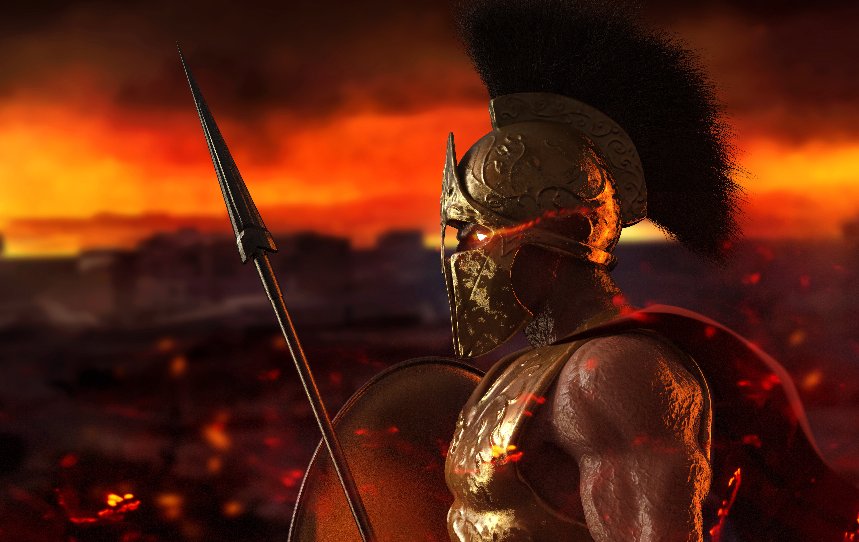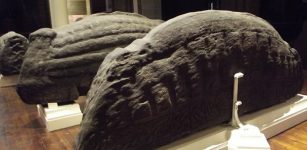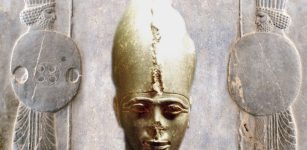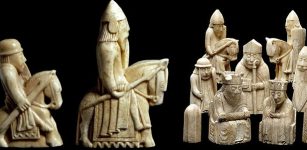War God Ares Was Brutal, Merciless And Disliked By Greeks But Popular In His Love Affairs
A. Sutherland - AncientPages.com - In Greek mythology, Ares was the god of war and violence but was not nearly as prominent in ancient Greece as his counterpart Mars was in ancient Rome.
He was also the spirit of battle, who never developed moral functions to stand as a good example.
 Ares – god of war, a symbol of violence, brutality, destruction, and man-slaughtering. Image credit: Credit: Adobe Stock - breakermaximus
Ares – god of war, a symbol of violence, brutality, destruction, and man-slaughtering. Image credit: Credit: Adobe Stock - breakermaximus
Ares loved war for its own sake; he symbolized tumult and chaos and was delighted to see the slaughter of men and the destruction of towns. He was not influenced by fighting but sometimes assisted one and sometimes the other in the battle. The name of Ares alone was a source of horror to the Greeks, though there was nothing hideous or disgusting in the appearance of the god who bore it. Ares stood for the war's wild and cruel nature and enjoyed the battle's tumult and bloodshed.
On the other hand, as the son of Zeus and Hera, the violent sides of Ares can be reflected in his parents' stormy relationship.
Ares was a beautiful and handsome god who never developed any moral functions, was impossible to restrain, and almost certainly was no good example to follow. Unlike his Roman counterpart, Mars, his worship was not extensive.
There are two known temples dedicated to him. One was located in Metropolis, a part of the Hellenistic kingdom of Pergamum, and during this period, the city flourished, reaching a zenith of cultural and economic life. Ares' worship was mainly focused on the northern areas of Greece. Being mighty warriors, the Spartans also held him in high regard.
In Iliad 5.846-909, we read that "war god Ares returns to Mount Olympus after being severely wounded on the Trojan battlefield by the Greek hero Diomedes, whose spear was guided by the warrior goddess Athena. Upon his arrival, Ares is greeted with harsh words from his very own father, Zeus, the king of the gods:
"To me, you are the most hateful of all the gods who hold Olympus. Forever quarreling is dear to your heart, wars, and battles." 1
 Ares God of war in Greek mythology. Source
Ares God of war in Greek mythology. Source
But this is the very meaning of the name Ares - the "Destroyer," isn't it?
Athena was the goddess of strategy instead of Ares's power, chaos, and destruction, who was not one of the most popular divinities of the Greek Pantheon. The Greeks, unlike the Romans, were not warlike people, and Ares was not one of their favorite and trusted gods.
Ares' origin was controversial, and his birthplace was considered Thrace, a country with a harsh climate and very warlike people (according to Homer). As he was never a popular Olympian divinity, his depictions are not very common in Greek art. Also, the myths and legends describing Ares are not particularly extensive regarding his person. Despite being hated and least respected by the Greek gods in the Pantheon, Ares could keep good relationships with women, who made him famous as he never used tricks and force toward them.
However, more positive features of his character have never been found in his personality.
Aphrodite And Ares As Secret Rival Of Hephaestus
On Olympus, Ares became the secret rival of the skilled Hephaestus, the lover of his legitimate wife, Aphrodite.
This love affair delivered 'some' embarrassment. When god was making love to the goddess, he was observed by Helios ("Sun") in Greek religion, who drove a chariot daily from east to west across the sky.
Helmeted young warrior, so-called Ares. Roman copy from a Greek original—this is a plaster replica, the original is now stored in the Museum of the Villa. Canope at the Villa Adriana in Tivoli. Image credit: Patrick Denker from Athens, GA - CC BY 2.0
Helios reported the event to Aphrodite's husband, Hephaestus, who prepared a unique, fragile but strong net, which he fixed on the lovers' bed, and then went on a journey to return at an unexpected moment for the lovers. He found them entangled in the net.
Hephaestus called all the gods, not just the goddesses. The situation between the lovers became embarrassing. As a result, Ares was to compensate Hephaestus for the insult he had suffered. On the other hand, Ares fled to Thrace after this affair, while Aphrodite traveled to Cyprus. Both of them did not appear among the gods for some time.
From the union of Ares with Aphrodite came into the world sons, Eros and Anteros, Phobos (God of phobias and fear), Deimos (God of terror), Harmonia (goddess of harmony), and Adrestia (goddess of revolt). Consequently, his frequent love affairs with mortal women fathered violent, disorderly sons and even skilled female warriors, Amazons.
The daughter of Ares was also Alkippe, later violated by Poseidon's son, Halirrhothius. Ares killed him, and for this killing, he stood before the tribunal of the twelve Olympic gods on the Athens hill (the Areopagus) that later became the site of Athens's future criminal trials. In this trial, Ares was acquitted by the court because his violent action against Halirrhothius was justified.
Wrong Contacts With Goddess Athena
In Greek literature, he symbolizes violence, brutality, destruction, and man-slaughtering, which undeniably contradicts her sister, Athena, a great goddess of wisdom, warfare, and intelligence who has aided the heroes like Perseus, Heracles, Bellerophon, and Jason.
The goddess Athena hated Ares. One day, she skillfully turned the spear of the Achaean hero Diomedes against Ares. The weapon found an unarmored spot and pierced Ares ' stomach. With a wild howl, Ares left the battlefield and flew to Olympus with a complaint about Athena.
Zeus did not even want to listen to his' explanation. Ares was punished fairly and deserved to be not on Olympus but in Tartarus.
Written by – A. Sutherland - AncientPages.com Senior Staff Writer
Updated on February 10, 2024
Copyright © AncientPages.com All rights reserved. This material may not be published, broadcast, rewritten or redistributed in whole or part without the express written permission of AncientPages.com
Expand for referencesMore From Ancient Pages
-
 Bizarre Sound Of A Crash Remains An Unexplained Mystery
Featured Stories | Oct 22, 2020
Bizarre Sound Of A Crash Remains An Unexplained Mystery
Featured Stories | Oct 22, 2020 -
 Gryla: Cannibalistic, Evil Troll And Her Sons ‘Yule Lads’ – In Icelandic Folklore
Christmas Traditions | Dec 23, 2024
Gryla: Cannibalistic, Evil Troll And Her Sons ‘Yule Lads’ – In Icelandic Folklore
Christmas Traditions | Dec 23, 2024 -
 Huge Ancient Underwater Structure And Stunning Artifacts Discovered Off The Coast Of Salamis
Archaeology | Jun 26, 2019
Huge Ancient Underwater Structure And Stunning Artifacts Discovered Off The Coast Of Salamis
Archaeology | Jun 26, 2019 -
 The Govan Stones – Treasures From The Viking Era In Britain
Featured Stories | Dec 27, 2015
The Govan Stones – Treasures From The Viking Era In Britain
Featured Stories | Dec 27, 2015 -
 Pharaoh Psamtik III’s Deadly Encounter With Cambyses II Of Persia Ended The 26th Dynasty Of Egypt
Featured Stories | Apr 16, 2021
Pharaoh Psamtik III’s Deadly Encounter With Cambyses II Of Persia Ended The 26th Dynasty Of Egypt
Featured Stories | Apr 16, 2021 -
 Kadıkalesi Castle Ancient Ruins: Female Skeleton Unearthed At An Archaeological Dig
Archaeology | Jan 9, 2023
Kadıkalesi Castle Ancient Ruins: Female Skeleton Unearthed At An Archaeological Dig
Archaeology | Jan 9, 2023 -
 Bacteria Found In 4,000-Year-Old Human Molars Found In Cave – Responsible For Tooth Decay And Gum Disease – New Study
Archaeology | Mar 30, 2024
Bacteria Found In 4,000-Year-Old Human Molars Found In Cave – Responsible For Tooth Decay And Gum Disease – New Study
Archaeology | Mar 30, 2024 -
 Goibniu: The Sword Smith Of Tuatha De Danann Who Forged Weapons For Battles In Celtic Mythology
Celtic Mythology | Jan 31, 2020
Goibniu: The Sword Smith Of Tuatha De Danann Who Forged Weapons For Battles In Celtic Mythology
Celtic Mythology | Jan 31, 2020 -
 Researchers Reconstruct Genome Of Centuries-Old E. Coli Using Fragments Extracted From An Italian Mummy
News | Jun 18, 2022
Researchers Reconstruct Genome Of Centuries-Old E. Coli Using Fragments Extracted From An Italian Mummy
News | Jun 18, 2022 -
 Oldest Modern Human Genome Identified With The Help Of Neanderthal Ancestry
Archaeology | Apr 14, 2021
Oldest Modern Human Genome Identified With The Help Of Neanderthal Ancestry
Archaeology | Apr 14, 2021 -
 Mystery Of Mexico’s Bizarre Mummy May Never Be Solved
Featured Stories | Sep 17, 2024
Mystery Of Mexico’s Bizarre Mummy May Never Be Solved
Featured Stories | Sep 17, 2024 -
 On This Day In History: Captain James Cook Spotted The East Coast Of Australia – On Apr 19, 1770
News | Apr 19, 2016
On This Day In History: Captain James Cook Spotted The East Coast Of Australia – On Apr 19, 1770
News | Apr 19, 2016 -
 Earliest Modern Human Fossil Outside Africa Unearthed At Misliya Cave, Israel
Archaeology | Jan 27, 2018
Earliest Modern Human Fossil Outside Africa Unearthed At Misliya Cave, Israel
Archaeology | Jan 27, 2018 -
 St. Simeon’s Monastery And History Of Its Founder Shed Light On Christian Past In Anatolia
Archaeology | Nov 28, 2020
St. Simeon’s Monastery And History Of Its Founder Shed Light On Christian Past In Anatolia
Archaeology | Nov 28, 2020 -
 True Colors Of The Parthenon Sculptures Revealed In New Study
Artifacts | Oct 12, 2023
True Colors Of The Parthenon Sculptures Revealed In New Study
Artifacts | Oct 12, 2023 -
 Mystery Of The Beautiful Viking Uig Chessmen Found On The Isle Of Lewis, Scotland
Artifacts | Dec 14, 2015
Mystery Of The Beautiful Viking Uig Chessmen Found On The Isle Of Lewis, Scotland
Artifacts | Dec 14, 2015 -
 Unique Ancient Coast Salish War Club Accidently Discovered In British Columbia Backyard
Archaeology | Mar 22, 2022
Unique Ancient Coast Salish War Club Accidently Discovered In British Columbia Backyard
Archaeology | Mar 22, 2022 -
 Long-Lost Ancient Burial Mounds Of The Havana Hopewell Culture Re-Discovered In Iowa
Archaeology | Apr 6, 2021
Long-Lost Ancient Burial Mounds Of The Havana Hopewell Culture Re-Discovered In Iowa
Archaeology | Apr 6, 2021 -
 Ryujin: Benevolent And Righteous Dragon-King And Sea God In Japanese Legends
Featured Stories | Jun 10, 2024
Ryujin: Benevolent And Righteous Dragon-King And Sea God In Japanese Legends
Featured Stories | Jun 10, 2024 -
 Mystery Of The Tomb Of Nestor’s Cup Unraveled
Archaeology | Oct 6, 2021
Mystery Of The Tomb Of Nestor’s Cup Unraveled
Archaeology | Oct 6, 2021

